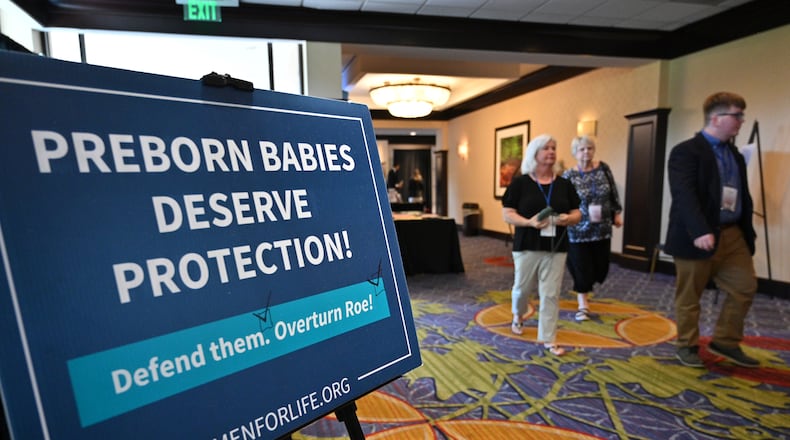Georgia legislators say they are taking a wait-and-see approach after a Fulton County judge overturned the state’s 2019 abortion law on Tuesday and told lawmakers they would need to pass new legislation if they wanted to reinstate limits on the procedure.
Fulton Superior Court Judge Robert McBurney on Tuesday ordered the state to no longer enforce the 2019 law, which banned most abortions once a doctor could detect fetal cardiac activity, typically about six weeks into a pregnancy and before many know they are pregnant. The law had been in effect in Georgia since July.
McBurney’s order said abortions must be regulated as they were before Georgia’s 2019 law took effect — meaning the procedure is again allowed up until about 22 weeks of pregnancy. The attorney general’s office appealed Tuesday’s ruling to the Georgia Supreme Court.
Republican legislative leaders didn’t say whether they’d pursue legislation next year but expressed confidence the court’s final decision will go their way. Members of the court are generally appointed by the governor and then periodically stand for reelection.
“Obviously, the state’s legal team has strong grounds for appealing this illogical ruling,” said state Senate Majority Leader Steve Gooch, a Dahlonega Republican. “The Legislature acted to protect the unborn on behalf of the people of Georgia, and we are confident that the unfortunate situation created by a lone judge’s opinion will be temporary and quickly resolved within the judiciary.”
A ruling by the 11th U.S. Circuit Court of Appeals in July allowed Georgia’s 2019 abortion law to be enforced. The U.S. Supreme Court’s June decision in Dobbs v. Jackson Women’s Health Organization that overturned Roe v. Wade paved the way for Georgia’s law to take effect.
State Rep. Ed Setzler, an Acworth Republican who sponsored the 2019 anti-abortion legislation, called McBurney’s ruling reversing the federal court of appeals’ July decision “nonsense.”
“It’s no surprise that a liberal Fulton County judge put a temporary roadblock into the implementation of the (anti-abortion law),” said Setzler, who last week was elected to the state Senate. “It won’t take long for the state Supreme Court to rule in favor of the (law) and put it into full effect.”
McBurney was appointed to the bench by Republican Gov. Nathan Deal, but GOP lawmakers frequently describe judges who rule against them as “liberal.”
Attorneys for abortion rights activists and providers last month argued that when the law passed in 2019, Roe v. Wade — the 1973 U.S. Supreme Court ruling that guaranteed a right to an abortion until a fetus was viable outside the mother’s body — was the law of the land and state law does not allow the Legislature to enact statutes that violate the law.
McBurney agreed and said that just because a June U.S. Supreme Court decision in Dobbs v. Jackson Women’s Health Organization overturned Roe, it did not retroactively make the 2019 passage of Georgia’s abortion law legal.
Instead, McBurney told legislators they would have to take the measure back through the legislative process.
“Our state legislators are now, under Dobbs, free to move away from a post-viability ban in an effort to strike a different balance between the interests of fetal life and women’s bodily autonomy, should they conclude that that is what is best for Georgians,” McBurney wrote.
Kaleb McMichen, who was a spokesman for the late House Speaker David Ralston, said the House Republican Caucus also stands behind the attorney general’s decision to appeal. Any of the House caucus’ 101 members could decide to file legislation restricting abortion, but McMichen said he is unaware of anyone having plans to do so.
“We’re going to let the legal process continue to work, and if there needs to be a change in our approach at some point, we can address that,” he said.
If lawmakers decide to pursue similar legislation when the session begins in January, it’s unclear whether another attempt would pass the current makeup of the General Assembly. The law narrowly passed the House in 2019, with a handful of Republicans voting against it, and the chamber’s GOP caucus has shrunk since then.
Democratic lawmakers are celebrating the legal win, but they say they are preparing for what could come in the next legislative session.
“We would hope that our Republican colleagues take a look at the landscape and realize there are very serious and very broad concerns toward stripping away this right women have had for 50 years in Georgia,” said Senate Democratic Caucus Chairwoman Elena Parent of Atlanta. “Maybe they should let well enough alone.”
Anti-abortion groups such as Georgia Right to Life have pushed state lawmakers to outlaw the procedure in all instances by amending the state’s constitution to grant rights to a zygote upon conception, often referred to as “personhood.” GRTL Executive Director Zemmie Fleck said Tuesday’s ruling does not change her organization’s approach.
“It does not really bear a lot of weight on what we already work toward, and that is to actually have a personhood amendment to the state constitution which would recognize all innocent human beings at conception to have the same rights that are bestowed upon persons,” she said.
McBurney on Tuesday struck down sections of the 2019 law that limited when abortions could be performed and changed the reporting requirements for providers. Other “personhood” portions of the law, such as allowing parents to claim a zygote or fetus as a dependent on their taxes or counting zygotes or fetuses in the state’s population, will remain on the books.
About the Author
Keep Reading
The Latest
Featured



